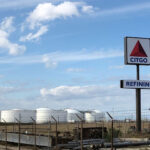From The Wall Street Journal
A federal appeals court declined to stop a planned sale of Venezuela’s Citgo Petroleum Corp., advancing an auction process engineered by one of the country’s many unpaid creditors.
The ruling issued by the U.S. Court of Appeals for the Third Circuit late Friday marks a setback for Venezuela’s state energy company, which has tried desperately to keep control of Citgo amid a deepening financial crisis in the country. Petróleos de Venezuela SA, or PdVSA, relies on Citgo’s network of U.S. refineries to process heavy Venezuelan crude shipped across the Caribbean and to generate much-needed hard currency.
Now multinational companies are targeting Citgo, hoping to resolve claims against Venezuela arising from a nationalization campaign that commandeered large investments there. One of those companies, Crystallex International Corp., won a court order in August authorizing the sale of Citgo’s U.S. corporate parent to satisfy a $1.4 billion government debt.
Friday’s ruling narrowed PdVSA’s options for retaining the subsidiary, declining to issue a so-called writ of mandamus to reverse the sale order. PdVSA has another pending appeal related to the lower court’s decisions.
A Citgo spokeswoman declined comment.
No sale is likely to take place before late December, when U.S. District Judge Leonard P. Stark has scheduled a hearing in Wilmington, Del., on how to structure a sale of some or all of the Citgo enterprise. Valued at more than $8 billion by some analysts, Citgo owns major U.S. oil refineries, pipelines and terminals that make it a critical strategic-energy asset.
Crystallex has proposed a stock sale overseen by U.S. marshals that could attract other energy companies as potential buyers. Citgo wants a more traditional marketing process, saying a rushed sale could destroy billions of dollars in value, cause a default on its debt and disrupt refining operations, putting thousands of U.S. jobs at risk.
Venezuela’s economic crisis has set off a scramble for control of Citgo, the only significant government asset that creditors can reach through the U.S. court system. Since last year, Venezuela and PdVSA have defaulted on tens of billions of dollars in bond obligations as the country’s economy has been wracked by U.S. sanctions, food shortages and spiraling hyperinflation. To avoid losing Citgo, PdVSA has been careful to continue paying down a particular $2.5 billion bond for which shares in the refiner are pledged as collateral.
Bondholders have bid up the price of those bonds in recent weeks, confident they would receive $842 million due on Monday because nonpayment would entitle them to wrest majority control of Citgo.
As Venezuela’s largest asset outside its borders, Citgo is an accessible source of dollars for frustrated bondholders and for creditors like Crystallex that won judgments through arbitration. Crystallex secured its award from an international investment-dispute panel after Venezuela took away the rights to develop one of the world’s largest gold deposits.
Crystallex, which went bankrupt in 2011 after the development venture collapsed, argued that PdVSA was an “alter ego” of Venezuela and asked permission to seize PdVSA’s commercial assets in the U.S., namely the parent holding company of Citgo.
PdVSA said that Venezuela’s control over PdVSA and its overseas assets amounted to nothing more than typical government regulations and ordinary shareholder control. Judge Stark sided with Crystallex, which pointed to everything from official tweets stating “PdVSA is Venezuela” to PdVSA trucks being used as physical barriers to block antigovernment demonstrators as evidence that the entities were inseparable.
Venezuela recently struck deals with energy producer ConocoPhillips Co. and mining company Rusoro Mining Ltd. to resolve their separate billion-dollar arbitration claims and to end their pursuit of Citgo. No such deal with Crystallex has been announced. If Venezuela doesn’t make required settlement payments, ConocoPhillips or Rusor could revive their Citgo claims.
Losing control of PdVSA’s largest external subsidiary would be a political defeat for Venezuela President Nicolás Maduro’s regime while potentially closing off one of its most important revenue sources. PdVSA has collected billions of dollars in dividends from Citgo in recent years while pledging its stock to secure financing from bondholders and Russia’s PAO Rosneft. U.S. sanctions put in place under the Trump administration now prohibit Citgo from sending corporate profits back to Venezuela.







